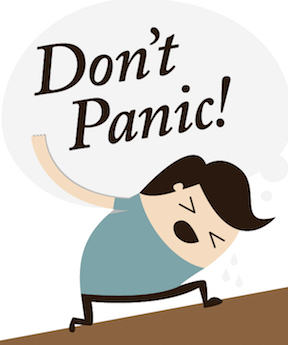
If Constant Worry Makes Life Difficult, It Could Be An Anxiety Disorder
By Jessica Park
We all feel anxious when taking a final exam or waiting on potentially bad news. Our body automatically responds when we feel scared or threatened, preparing us to fight or to run from danger. Occasional anxiety is a survival instinct that served our ancestors well. We may not have run-ins with charging mammoths these days, but this response still works.
Some people, however, experience anxiety constantly, when there’s no apparent danger. If intense feelings of fear, persistent or excessive worry, or fear of everyday situations make life difficult, it may be an anxiety disorder.
Anxiety disorders are the most common health problem diagnosed in the United States, affecting over 40 million adults, most frequently women. They’ve also been diagnosed in children and teenagers.
What causes anxiety disorders? Usually, it’s a combination of genetic and environmental factors. Someone who inherits a genetic tendency for anxiety disorders or grows up in a chaotic, abusive or neglectful environment is likely to develop one later. (Most people develop anxiety disorders before they turn 21.)
Stressful situations, traumatic events, grief or prolonged illness can also cause anxiety disorders. They’re also frequently present in people who have other mental health conditions, such as depression, ADHD, eating disorders or substance abuse.
While people with anxiety disorders might have no rational reason to worry or panic, having an anxiety disorder doesn’t make them “crazy.” Someone with panic disorder can’t just snap out of a panic attack and calm down – in fact, forcing oneself to calm down during a panic attack usually makes it worse. Anxiety disorders can disrupt a person’s daily routines, social life or enjoyment of favorite activities.
Fortunately, anxiety disorders can be treated with multiple approaches. Lifestyle changes, learning stress management and relaxation techniques, regular exercise and enough sleep can lessen anxiety. Many people also find psychotherapy or cognitive behavioral therapy helpful to identify their anxiety-inducing thought patterns.
“Generally speaking, counseling alone can be sufficient for some people to learn better ways of managing thoughts that exacerbate anxiety,” says Rob McGavock, MEd, LPC, a licensed professional counselor with Boone Hospital Center’s Employee Assistance Program.
Rob says when people don’t respond well to counseling alone, an evaluation by a physician and treatment with medication is often helpful. He explains that the brain’s neurochemistry is impacted and fatigued by years of ongoing, excessive worry. Many people with anxiety disorders don’t realize they’re excessively worried because it’s become their norm. Eventually, this prolonged, excessive worry may cause acute panic attacks that seem to come out of nowhere.
Anxiety is often treated first with SSRI antidepressants such as Lexapro, Zoloft or Celexa. “These now come as generics and are inexpensive. They’re also not addictive,” Rob notes. Anti-anxiety medications may also be prescribed, if needed, for acute episodes.
People with severe anxiety may need to see a psychiatrist to rule out bipolar disorder, clinical depression, or obsessive-compulsive disorder. “These issues can all produce anxiety, and they require specialized evaluation and treatment,” Rob says.
Anxiety disorders cause both emotional and physical symptoms.
Emotional symptoms may include:
• an unfounded sense of dread
• feeling tense or jumpy
• startling easily
• anticipating the worst
• hypervigilance (always looking out for danger)
Physical symptoms may include:
• heart palpitations or rapid heartbeat
• upset stomach and indigestion
• sweating
• tremors or twitches
• fatigue
• headaches
• insomnia
Some anxiety disorders’ symptoms may be mistaken for symptoms of hyperthyroidism, cardiac or digestive conditions. Talk to your primary care provider to rule these out.
All anxiety disorders are marked by persistent and excessive worry, but other symptoms may vary, depending on the kind of anxiety disorder one has:
Panic Disorder
People with panic disorder experience attacks that strike suddenly and repeatedly, without warning. A panic attack can feel like a heart attack, with shortness of breath, heart palpitations, chest pain or dizziness. Fear of future panic attacks may cause social withdrawal.
Generalized Anxiety Disorder (GAD)
People with generalized anxiety disorder feel chronic, exaggerated worry with no specific cause. Headaches, physical tension and exhaustion are common symptoms. Constant anticipation can make it difficult for people with GAD to concentrate or finish tasks.
Social Anxiety Disorder
People with social anxiety disorder aren’t shy or introverted – they feel irrational fears of being embarrassed in social situations and may experience panic attacks. As a result, people with social anxiety disorder often isolate themselves.
If anxiety is making it hard to enjoy your life or making you feel unwell, talk to your doctor about an evaluation or referral to a mental health professional.